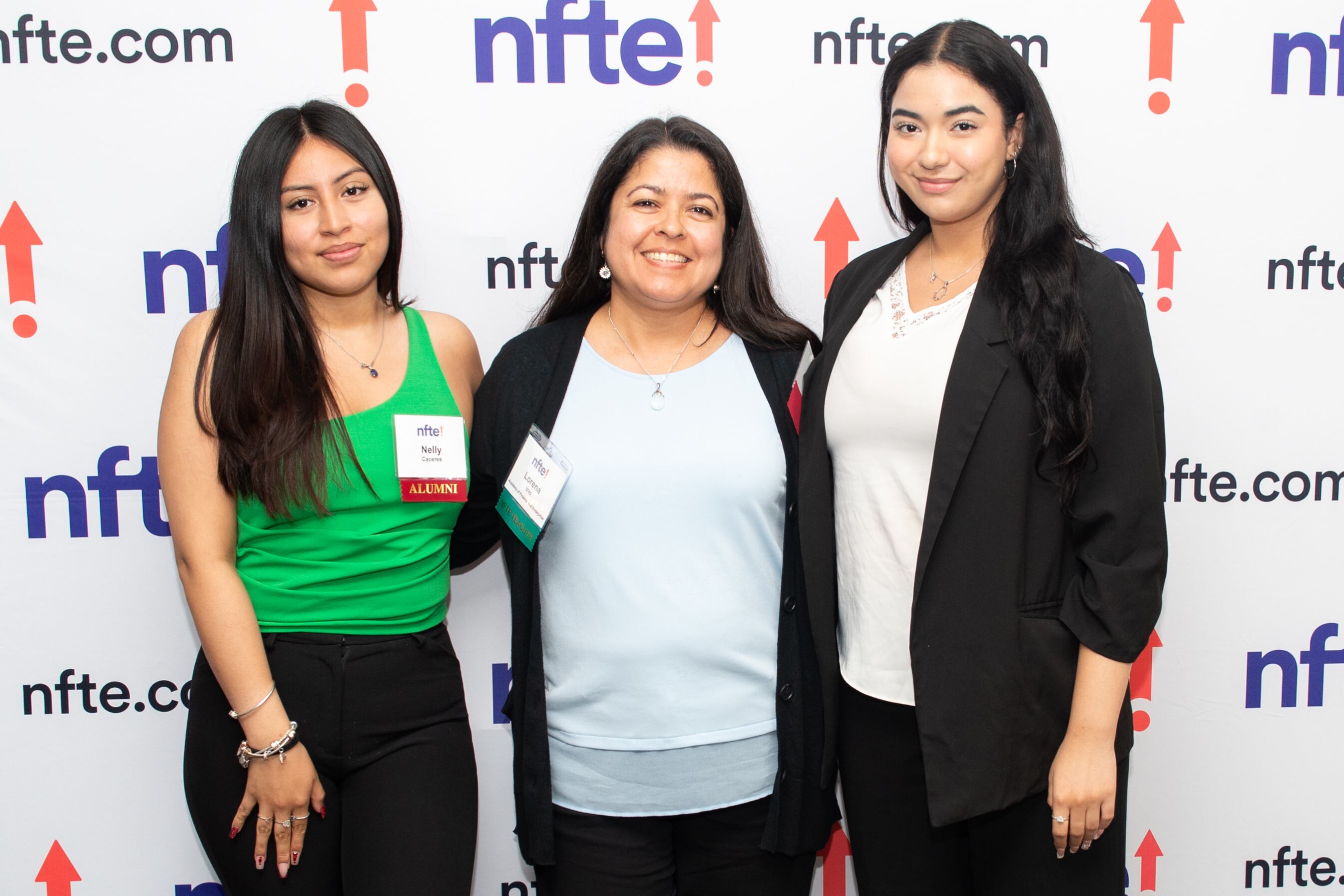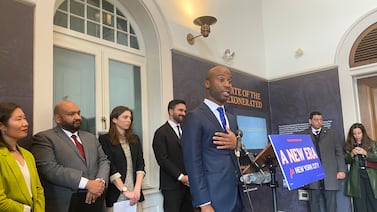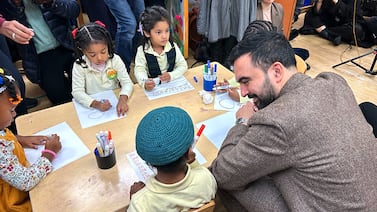Lorena Izzo was working as an accountant about 20 years ago when she was assigned to oversee a college intern and realized her true calling: to become a teacher.
She returned to her alma mater, Hofstra University, to get a master’s in math education (on top of her MBA). She landed a job at the Academy of Finance and Enterprise in Long Island City, Queens, and she has remained there for nearly 17 years, teaching entrepreneurship, financial services, and accounting.
“My students create business plans from scratch,” Izzo said, “starting with the research phase and finishing with viable business ideas that are ready to be presented at national competitions in front of potential investors.”
Some teens have even won seed money for their ideas, with one such student marketing a homemade hand cream to local nail salons and another selling napkins and towels that she personalized with embroidery.
In raising the question, “What is the purpose of school?” New York City schools Chancellor David Banks often talks about the importance of ensuring students have real-world workforce experience and are financially literate. Banks visited Izzo’s class on entrepreneurship last year to see her in action and hear from her students about how they’re preparing for their futures, Izzo recounted.
Izzo began teaching entrepreneurship by chance. Soon after she started working at Finance and Enterprise, her principal asked her to join a class for educators held by the Network for Teaching Entrepreneurship, or NFTE, a nonprofit focused on empowering students to build their own businesses. That experience changed her path — as well as that of many of her students.
The organization provides Izzo with a curriculum and professional development. It offers mentors and coaches to her students, who often go on job-shadowing trips and take career readiness workshops.
Several of Izzo’s students have participated in the organization’s National Youth Entrepreneurship Challenge. Two students recently made regionals for their subscription company for culturally diverse treats, inspired by their own challenges finding authentic Vietnamese and Algerian desserts. Another student who always longed for more help with styling her curly hair created an app that recommends styling products and tips.
“It’s very inspiring to see how they take something they see as a problem, and they come up with their own solution,” Izzo said.
This interview has been lightly edited for length and clarity.
Tell us about your own experience with school and how it affects your work today.
I went into teaching because every day is different. That’s what made me want to come out of accounting. Every day was the same.
I’ve been teaching the entrepreneurship class for over a decade now, but it is different every year because the students are always different. Technology is constantly changing along with styles and trends.
I remember 10 years ago, a student told me they were going to send their product to someone on YouTube. I didn’t see how that was a business plan and gave her a zero. Then I saw that person [from YouTube] on television, and the student explained what an influencer was. She was like, “Did you change my grade?” Yes, I did.
Why did you decide to focus on entrepreneurship education?
I loved the class that first year of teaching it. It’s very different from teaching finance and accounting. When teaching entrepreneurship, you get to really know your students through the businesses they want to start. You get to know what drives them, and you’re part of the whole process of making that happen.
My entrepreneurship class is not just about memorizing facts and dates but applying those skills students are learning in class. They can apply them to anything, even if they’re not going to start a business. Maybe students are going into the medical field and want to become doctors. Regardless of the career choices my students make beyond this class, when they face a problem, they will already be thinking about all the opportunities to come up with a solution. And this will open many doors for them.
What’s your favorite lesson to teach and why?
One of the lessons I absolutely love to teach in my Entrepreneurship 1 class is our LEGO activity because it also touches upon accounting.
It’s a very hands-on activity where the students get to play with LEGOs and create a toy. But they also have to tell us a few things: They need to identify the target market for the toy they created, the cost of the materials, and the labor that will be needed. So it helps them figure out what to do for their own projects while practicing on LEGOs.
I mean who doesn’t like to play with LEGOs? The students have so much fun with this one.
What’s something happening in the community that affects what goes on inside your classroom or your school?
My classroom did see an increase in English-language learners, and with that came the need to adapt our curriculum to several languages including Spanish and French. Google Translate has been a major tool to overcome language barriers. I speak Spanish but not French, for example, so when I can’t translate for students personally, I rely on Google Translate.
But at the end of the day, the lessons of the curriculum are so universal and applicable to everyday things that, even if it takes them a little bit more time, they always learn and have fun in my classroom.
I have a student who is an English learner, and his business is a [bilingual English-Spanish] tutoring company that caters to both languages. So if there’s a language barrier, they will have a tutor who can teach you math and science in that language.
In your more than a decade in the classroom, what changes have you seen in terms of the skills your students need now?
I think that the dynamics of extracurricular activities outside the classroom have changed in the past couple of years because of the COVID-19 pandemic. We used to do a lot of trips where we would visit companies and give students the opportunity to shadow people in the industry, but this has become more challenging as companies aren’t all back in the office.
Our students absolutely love to be able to go out, go to companies, and talk to professionals to see what jobs and careers are out there for them. It’s also the little things that give them quite an impression, like, “Wow, look at their desk.” There was one trip last year where the students got free snacks, and they were like, “You give these out for free?”
It’s these experiences outside the classroom that broaden their horizons on what kind of workplaces to strive for and how to get there. And they can only get that from the people who work there.
What’s the best advice you’ve ever received, and how have you put it into practice?
This goes for all teachers, especially those who are still starting out: Always have a plan B for the unexpected.
It’s not just about trying to make things work while they’re working. I faced this issue during my first year of teaching where I had a lesson plan, tested it all out, and the next day the website my entire lesson plan was focused on was taken down. And another teacher told me, “You just didn’t have a plan B.”
Always have a plan B, whatever it may be. The last thing you need is chaos in the classroom.
Amy Zimmer is the bureau chief for Chalkbeat New York. Contact Amy at azimmer@chalkbeat.org.







